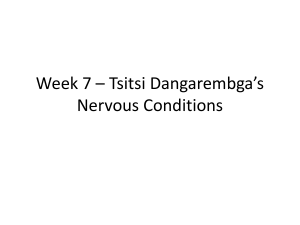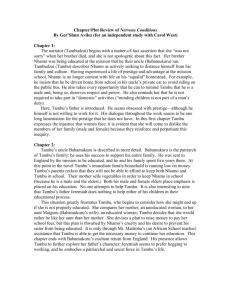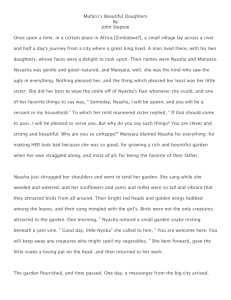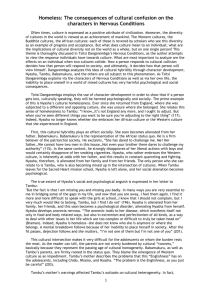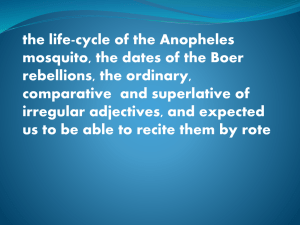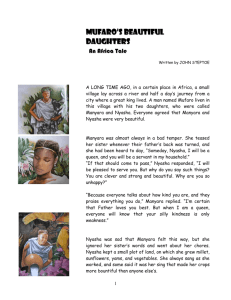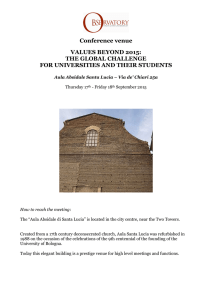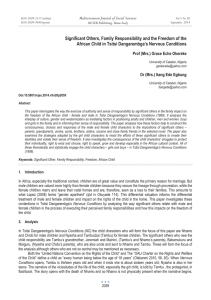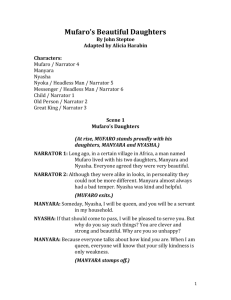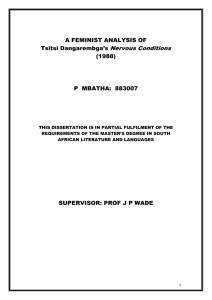Nervous Conditions Chapter 8 First half PowerPoint
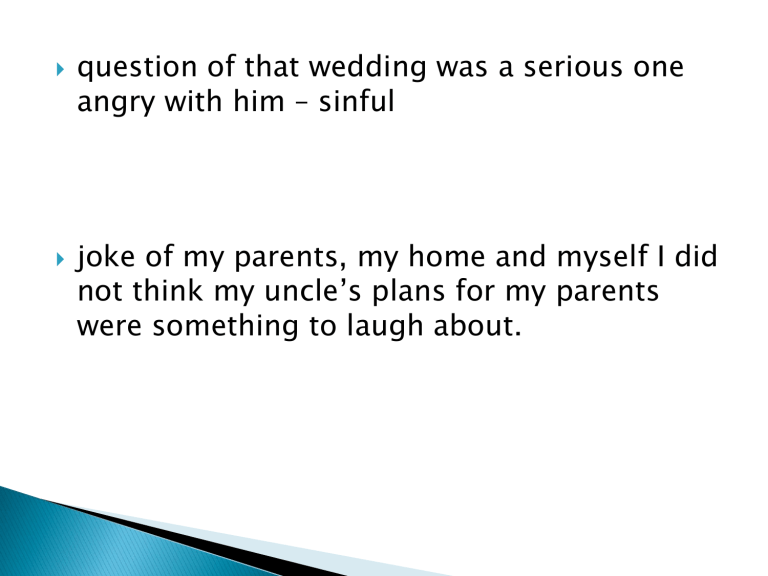
question of that wedding was a serious one angry with him – sinful
joke of my parents, my home and myself I did not think my uncle’s plans for my parents were something to laugh about.
Babamukuru who was my benefactor, my father for all practical purposes and who was also good, deserving of all love, respect and obedience. So I banished the anger.
They used to crack all the time when we were little, but we were much more professional now and most of them held together, which pleased
So those pots were definitely Nyasha’s craze, not mine, and while she was very concerned about making sure that they did not crack, while she was meticulous in scratching her designs, they did not matter much one way or the other to me, serving only to pass the time.
At these times I would forget that there were things I was not supposed to be thinking of, and the thoughts would creep back in such hazy disguises that they did not startle me into pushing them away but could linger and chip away at my defences, leaving me anxious and sleepless without knowing exactly why.
Sin had become a powerful concept for me during my year at the mission
It was a complex problem, too complex for me to think my way out of, so I pushed it once more to the back of my mind.
Nyasha was something unique and necessary for me. I did not like to spend too long without talking to her about the things that worried me because she would, I knew, pluck out the heart of the problem with her multidirectional mind and present it to me in ways that made sense, but not only that, in ways that implied also that problems existed not to be worried over but to extend us in our search for solutions.
Deep in the less accessible areas of my mind, although outwardly I would have hotly denied it, I was ashamed of what to me was a pervasive and enervating vagueness.
Consciously I thought my direction was clear: I was being educated.When I had been educated, I would find a job and settle down to it, carrying on, in the time that was available before I was married into a new home, Babamukuru’s great work of developing the family. Issues were well defined for me at that time: these were the goals and this was how we would reach them. Babamukuru was my touchstone who showed me that this was true. So I should have been content to go to school and achieve my good grades. I should have been content with preparing myself for the life I have described. But Nyasha’s energy, at times stormy and turbulent, at times confidently serene, but always reaching, reaching a little further than I had even thought of reaching, was beginning to indicate that there were other directions to be taken, other struggles to engage in besides the consuming desire to emancipate myself and my family. Nyasha gave me the impression of moving, always moving and striving towards some state that she had seen and accepted a long time ago. Apprehensive as I was, vague as I was about the nature of her destination, I wanted to go with her. I did not want to be left behind. And being so young, time measured in hours and half hours was important, so I did not want to spend three whole weeks away from my cousin.
‘Whew! It was good to have Mukoma here, it was good,’ observed my father, ‘but it puts a weight on your shoulders, a great weight on your shoulders!’
My father and Takesure found this amusing. They had a good laugh at Lucia’s expense.
thinking was a slow painful process for her because her mind had not been trained by schooling to do it quickly.
Since for most of her life my mother’s mind, belonging first to her father and then to her husband, had not been hers to make up, she was finding it difficult to come to a decision.
What I have endured for nineteen years I can endure for another nineteen, and nineteen more if need be.
because her body had appetites of which she was not ashamed, she moved back in with
Takesure. She did not make excuses for herself.
But I was disappointed in her, disappointed, disapproving and afraid too that she would start sleeping with my father again and increase our portion of sin so much that it would take much more than a wedding to exorcise it.
‘Don’t worry about things that don’t concern you,’ she advised
‘See, Jeremiah,’ praised Babamukuru, pleased with my father’s labour, ‘even your daughter is pleased when you have done a good job.’
He preferred peace and quiet, but when he tried to make Nyasha peaceful and quiet they always ended up in a rough and noisy quarrel.
Nyasha did not mind these rows because, she said, they cleared the air and But I could see that my uncle was growing more and more disappointed with his daughter.
Beside Nyasha I was a paragon of feminine decorum, principally because I hardly ever talked unless spoken to, and then only to answer with the utmost respect whatever question had been asked. Above all, I did not question things. It did not matter to me why things should be done this way rather than that way.
I simply accepted that this was so. I did not think that my reading was more important than washing the dishes, and I understood that panties should not be hung to dry in the bathroom where everybody could see them. I did not discuss
Anna’s leave conditions with Maiguru. I was not concerned that freedom fighters were referred to as terrorists, did not demand proof of God’s existence nor did I think that the missionaries, along with all the other Whites in Rhodesia, ought to have stayed at home. As a result of all these things that I did not think or do,
Babamukuru thought I was the sort of young woman a daughter ought to be and lost no opportunity to impress this point of view upon Nyasha. Far from being upset by these comparisons, she would agree that, apart from being a little spineless (which she thought could be corrected), yes, I was an exemplary young lady. Perhaps she would have reacted differently if she had known her father better. She did not realise how deeply he felt the misfortune of having a daughter like Nyasha. Not considering herself a misfortune, she could not have known how disillusioned her father was. She took seriously the reasons that Maiguru gave for
Babamukuru’s bad humour — he was busy, he had responsibilities — and on this basis made allowances for him so that she did not judge him too harshly and remained herself in spite of her father’s wishes.
‘I was thinking that if I could find work, any little job in this area,
‘Don’t you see two cars in my garage?’ he asked. ‘Why should you go by bus?’
Truly, we could not survive without you.
Those foreign places, those places you went, did not make you forget us. No! They enabled you to come back and perform miracles!’
‘Aren’t we all beneffitting from Babamukuru’s education?’ and she knelt worshipping beside Lucia.
Then it was Maiguru’s turn to take her place on the floor.
‘Thank you, Baba, thank you for finding Mainini Lucia a job.’ an intoxicating occasion. My first instinct was to join the adoring women — my mouth had already pursed itself for a loud ululation.
It was
‘Don’t you dare,’ Nyasha hissed, kicking me under the table. I unpursed my mouth, but the urge to extol Babamukuru’s magnanimity was implacable.
‘Thank you, Babamukuru,’ I said as calmly as I could so as not to disappoint Nyasha, ‘for finding Lucia a job.’
I was mesmerised by the sleight of hand that had lifted Lucia out of her misery, and even more seductive was the power that this sleight of hand represented. With the crescendos of praise, Babamukuru grew modest and egalitarian.
‘Stand up, stand up. Do not thank me. Lucia is the one who will be doing the work!’ he exclaimed.
I was so impressed with Babamukuru I could not stop admiring him. ... how good and kind...deserved all our love and loyalty and respect. But she told me I had misjudged the situation. It was the obligation of all decent people in positions like Babamukuru’s to do such things.
Nyasha had a way of looking at things that made it difficult for her to be impressed by
Babamukuru.
I simply was not ready to accept that
Babamukuru was a historical artefact; or that advantage and disadvantage were predetermined, so that Lucia could not really hope to achieve much as a result of
Babamukuru’s generosity; and that the benefit would only really be a long-term one if people like Babamukuru kept on fulfilling their social obligation; and people like Lucia would pull themselves together.
And what about poor Lucia! She’s been grovelling ever since she arrived to get Daddy to help her out. That sort of thing shouldn’t be necessary. Really it shouldn’t.’
declared that she could already feel her mind beginning to think more efficiently.
Nyasha’s attitude was disappointing, though:
I needed her moral support, since my doubts about the wedding had not resolved themselves.
Nyasha was all for sitting down with pencil and paper to sketch some stylish outfits, but
Babamukuru, feeling out of place in this feminine place, did not have the time and urged us to choose something out of the book.
‘He didn’t make half as much fuss when we got married,’ she confided to her daughter. ‘I had one bridesmaid and tea. No dinner. Of course I didn’t mind — it was all right then.
In the end Nyasha did not help Maiguru with the shopping. She practically took over.
the whole performance was ridiculous. The whole business reduced my parents to the level of the stars of a comic show, the entertainers.
wedding that made a mockery of the people I belonged to and placed doubt on my legitimate existence in this world.
It was necessary to exaggerate quite wildly to try to convince myself.... I simply did not believe these lies.
He would have a marvellous time playing the part of the groom and would carry it off too, but my mother’s case was entirely different.
My role in the comedy had been confirmed and rehearsed, but I still did not want to take part.
‘Do not take me at all. I don’t want to be in your stupid wedding,’ I wanted to shout.
Instead I said quietly and politely, ‘Very well,
Babamukuru. That will make things much easier for everybody.’
There was definitely something wrong with me, otherwise I would have had something to say for myself. I knew I had not taken a stand on many issues since coming to the mission,
And still I could not accept responsibility for my weakness, hoping instead to disguise it by suffering. I let guilt, so many razor- sharp edges of it, slice away at me. My mother had been right: I was unnatural; I would not listen to my own parents, but I would listen to Babamukuru even when he told me to laugh at my parents.
There was something unnatural about me.

